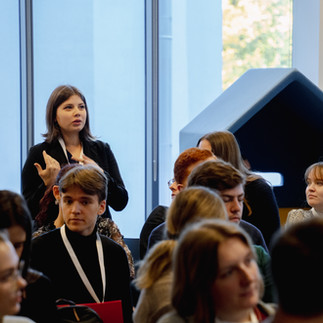German-Baltic Conference 2025 in Riga: “Rethinking Security Through Youth”
- it-supportdbjw
- 23. Okt.
- 2 Min. Lesezeit
From 16 to 19 October 2025, Riga hosted the 7th German-Baltic Conference (GBC) under the theme “Rethinking Security Through Youth.” The conference brought together young leaders, policymakers, security experts from across Europe to explore the role of youth in shaping Europe’s security and resilience.
Held under the patronage of MEP Rasa Juknevičienė, the event opened at the Latvian National Museum of History with greetings from German and Latvian officials, followed by a high-level panel on “Defending Freedom: Youth Engagement in National and Regional Security.” During the session, panellists discussed and responded to participants’ questions on how young people can meaningfully contribute to defence and crisis preparedness.
Over three intensive days at one of the venues of the University of Latvia, participants took part in expert sessions and interactive workshops. Presentations included a keynote by Christoph Eichhorn, former German Ambassador to Estonia and Bulgaria, alongside contributions from Prof. Dr. Wittpahl of Klaipėda University and Jānis Karlsbergs of NATO StratCom COE. Building on this expert input, participants worked in three thematic clusters, turning debate into concrete ideas and policy recommendations. The resulting recommendations will be presented to Members of the European Parliament in Brussels.
Cluster A – Youth-Centric Innovation in Defence proposed a modern “Total Defence Service Duty” integrating military, civil, and digital service options, and an Erasmus+ Resilience Track to connect youth with practical defence learning opportunities.
Cluster B – Youth Brain Drain and Security examined how demographic decline affects regional stability and proposed a Baltic Alliance for Security and Innovation Studies (BASIS) and an “I Choose the Baltics” initiative to turn brain drain into “brain circulation.”
Cluster C – European Security and Discourse explored the social dimension of security, calling for a digital platform to document Russian disinformation and hybrid attacks, a “Personal Preparedness Agenda” to enhance civic awareness, and a cultural network inspired by Arte to strengthen European identity and unity.
Meanwhile, the GBYEN organizations brought together youth-work professionals and organizations to exchange on “Security through Resilience.” Sessions addressed the experiences of Ukrainian youth during the war, cultural preservation in times of crisis, and the need for stronger civil-military cooperation. GBYEN organizations emphasized the need for greater youth involvement in security, resilience, and multi-level cooperation across Europe.
The German-Baltic Future Foundation warmly thanks all participants from 20 countries — including experts, cluster teams, and young journalists who documented the event and will later share their insights and reflections. Their engagement showed that young Europeans are not only participants but drivers of a more secure, united, and resilient Europe.





















